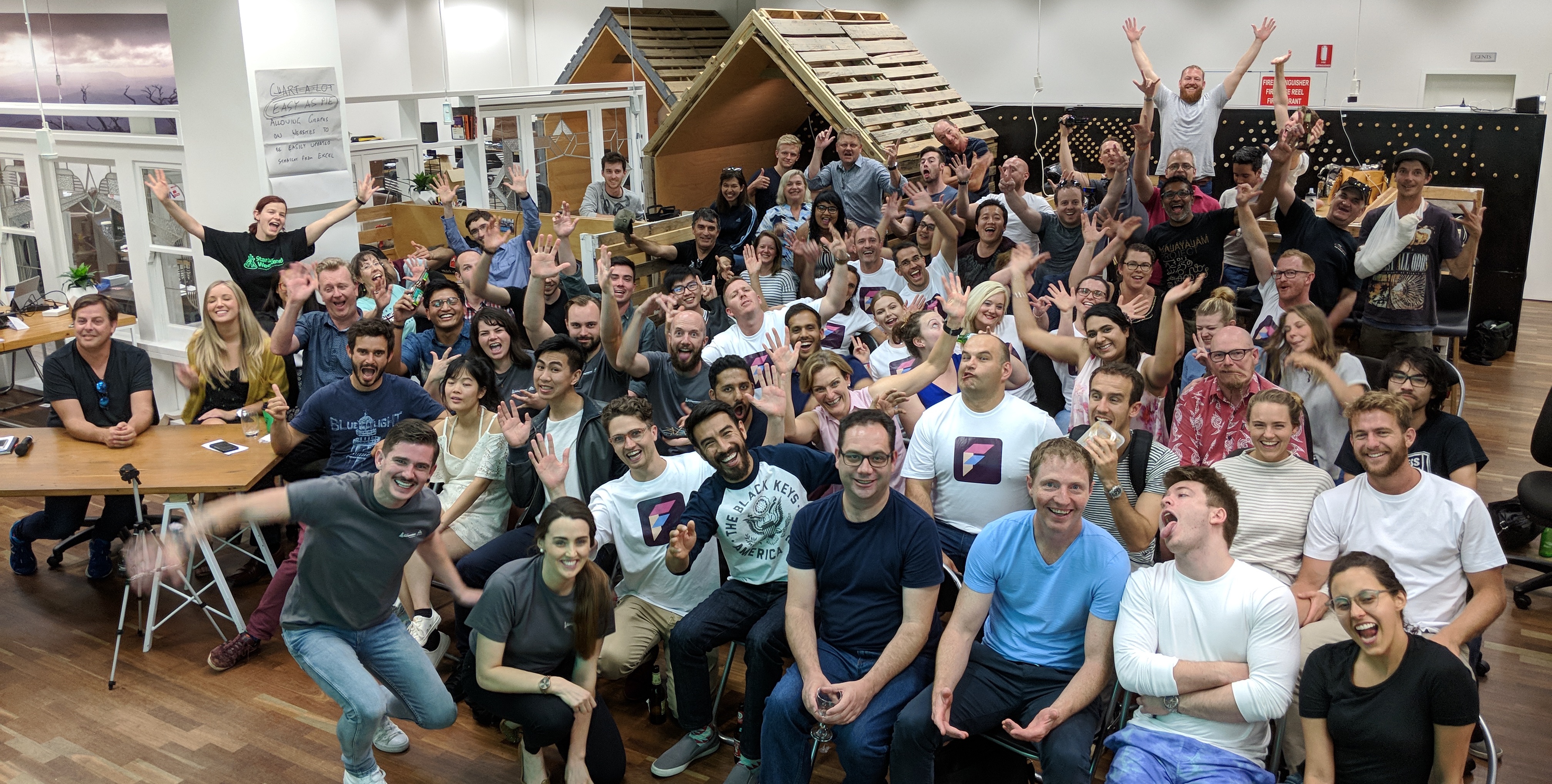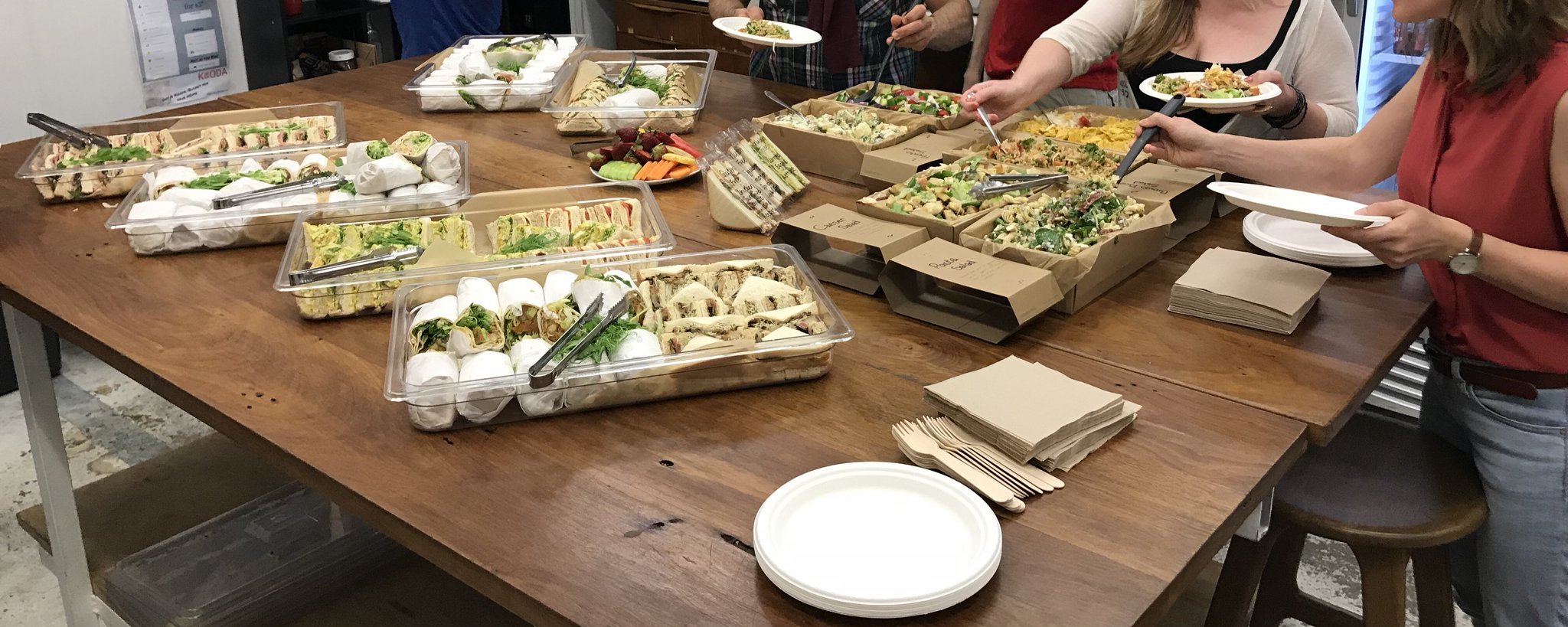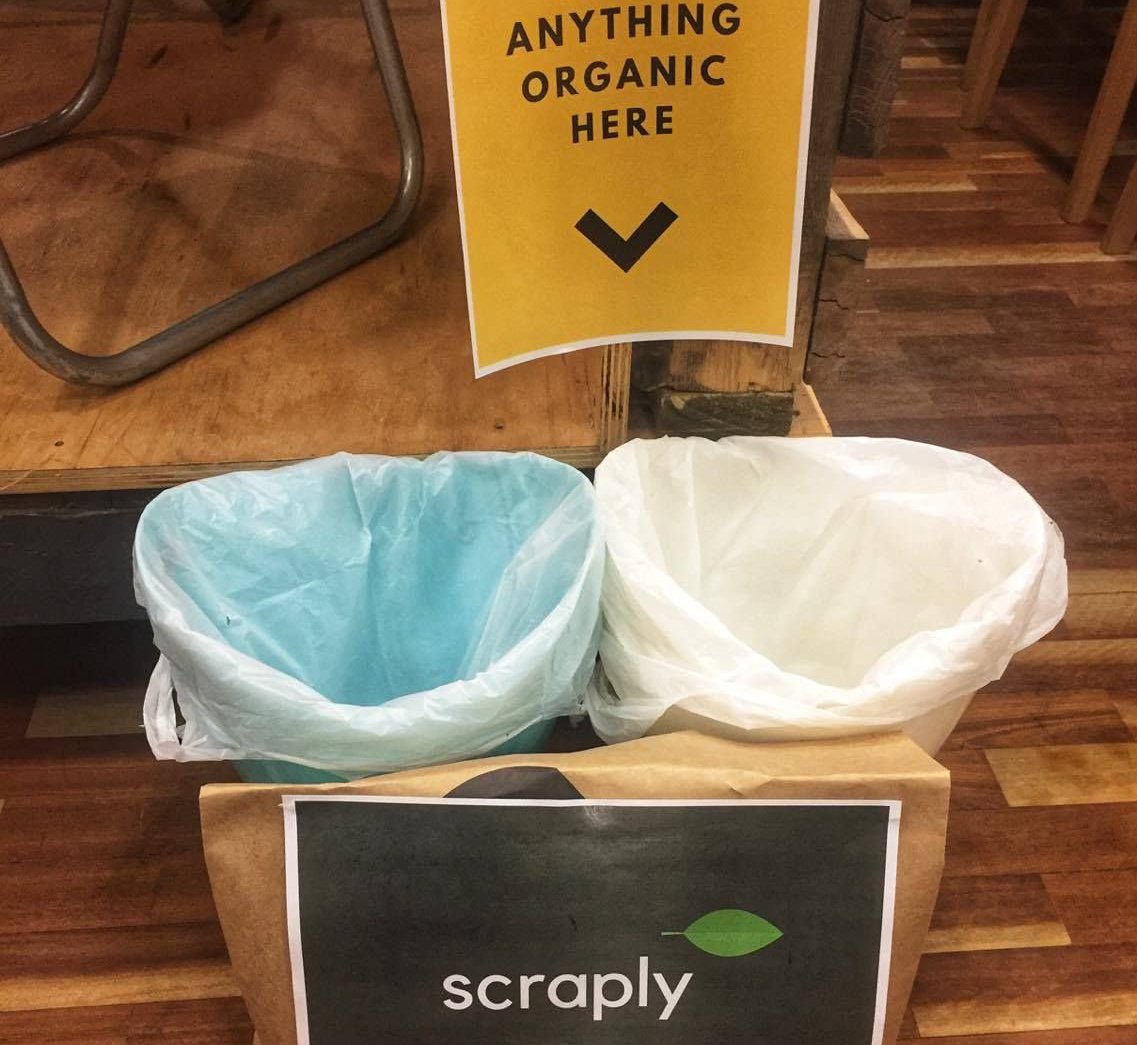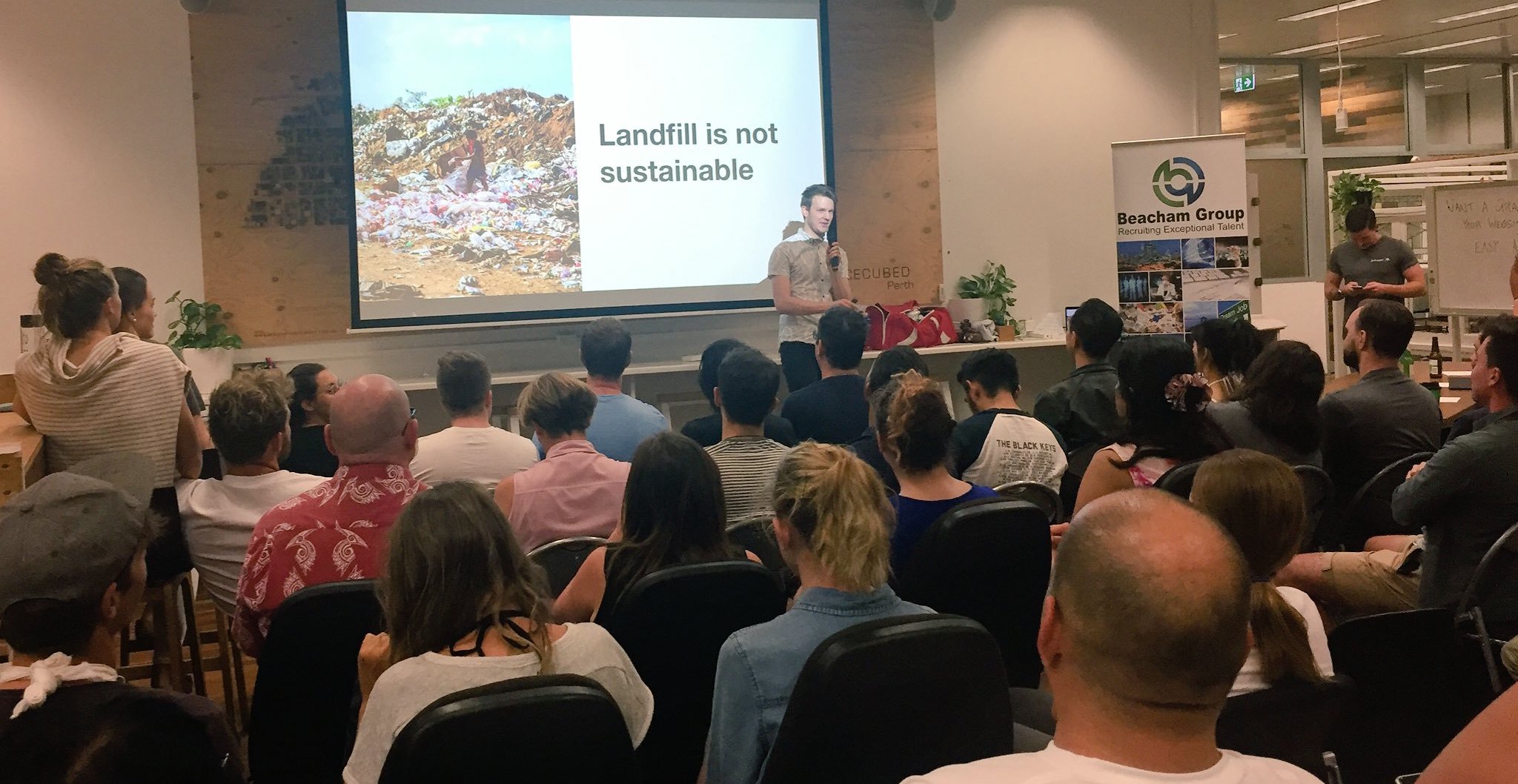What is startup weekend like?

It's 6:49. I'm about to head to the gym, when I recieve an unexpected a phone call from my friend, a successful investor and business advisor.
He explains to me in few words about the fact that he was going to startup weekend, and that he thinks I'd enjoy the weekend.
His passion has me enthralled, but never having been to a startup weekend I'm somewhat hesitant to sign up right away.
Eventually I decide to give up a weekend's worth of free time to come help him on this crazy adventure.
Two weeks later, my friend is about to pitch an idea in front of the croud of startup weekend participants. The idea is brilliant and I have no doubt he'll execute it brilliantly.
But I'm restless on my feet, pacing about the room. I have an idea inside of me, and although I'm keen to help his idea, I can't resist seeing if my idea could become something.
After much deliberation I run to the fashionably decorated wall and grab a pot plant.
Before it starts
When you sign up to startup weekend, unlike I did, I recommend deciding if you are going to pitch or join a team. If you are going to pitch, don't worry so much about the fine details of your business. Just concentrate on whether the business sounds like it has a lot of potential and concentrate on making yourself.
If you are not pitching a business idea, remember you are still pitching something - yourself. You get to sit back and relax while listening to all the ideas, but you will want to choose the one that sounds the best and/or resonates the most with you. To join that team, you will be pitching your own skills and experience to convince them to let you join. So make sure you know what are best things you have to offer.
Part 1: Networking
When I arrived at the startup weekend venue I saw my friend straight away and we signed in together. But quickly we were separated and began talking to other people. I was pleasantly surprised to find I already knew a few people from previous workplaces and the like.
I began meeting people and striking conversations with them. When people asked me if I was pitching I explained I was here to join a friend's team. But to practice my pitching skills I came up with an idea that had been in the back of my mind for a while - a business for connecting people with kitchen scraps to gardeners with compost bins.
Startup weekend always follows roughly the same format. On the first night (friday) you meet up for drinks and are encouraged to mingle with your fellow participants.
If you're not extraverted you might find this part intimidating or even boring. But try to make the most of it. If you are pitching this is a good opportunity to practice your pitch on other people you meet. But remember to be courteous and listen to their pitches in return.
Don't forget to ask people you talk to about their passions and interests while you're at it, not just their work.

Part 2: The pitches
With the pot in my hand, I almost walk into the building manager. I hastily ask her if it's okay if I borrow the plant. She simply remarks, "As long as you put it back." Then I join the queue of pitchers at the back.
You see, pitching really has no rules. You can (and should) do anything you can to make it memorable. Without thinking I already had one advantage; because I had been unsure for so long as to whether I would pitch I was now at the very back of the queue - the last pitch of the night.
But also, I took note of my surroundings and saw a plant - a prop I could use to solidify my composting idea in the minds of the other participants.
Anyone is free to pitch and there's no rules, just as long as you don't take longer than 30 seconds. You will be clapped off the stage.
Part 3: Building a team
I was excited by how receptive the audience of fellow participants was so I hastily ran to a table filled with pens and butchers paper. Someone there hands me a pen stating that for my idea I'd "have to use green".
After pitching, each person creates a sign and sticks it up on the wall. Your sign should remind participants of what your idea was. This will help you build your team. Don't worry about fancy company names, etc. They may forget what yours was. Just describe your business in 3 words. I wrote "Scraps 2 food".
Many people came up to ask a question or two about the business. You will want to try your best to convince people to join your team, but of course you can't force it or they will feel your are too authoritarian and won't want to join.
I found what worked for me was to ask them what they could offer the project, and what they would like to do if they could do anything over the weekend. You'll be surprised what unusual skills and interests will become invaluable as you build your idea.
One of my team members, for instance, boasted knowledge and interest in facebook chat bots, which I thought at first was unrelated, but turned out to be the cornerstone of building our product. More on that soon.
You'll generally want to find at least two team members, and I was lucky my last-minute pitch was good enough to convince two people to join my team.
Part 4: Doing the work
The excitement of stepping into your work space with your newly formed team is great. Try to get a feel of how your team wants to work together, and start putting together ideas.
You will want to start to build your business plan from the get go. After all, that's all you are building at the end of the day - a plan. A lot of people follow the lean canvas, and you can start from your initial idea and changing the until all the criteria from the lean canvas are well addressed.
For me I found letting go of these strict criteria helped our ideas to develop more organically for the first day. We started to build up a proper business plan as we went on.
You will need to be prepared to pivot your idea many times before the weekend ends. Pivoting is simply changing the plan without changing the end goal or at least the reason behind it. Rarely will someone come up with a flawless idea on first attempt. Pivoting will help you to ensure your idea is effective and realisable.
Don't get sidetracked too much building your actual product itself (e.g. software) except for the purposes of testing your idea. We made the mistake of building a marketplace for buying and selling compost and vegetables too early, which we ended up not using at all. We went with a simple webpage, which in the end only made one sale, and was only visible for one slide in our final presentation. Remember what you are really doing here - proving and pitching an idea, not building a complete shiny ecosystem.
You will want to get as much feedback as possible from customers. We visited local coffee shops to secure grounds and contacted local grocery stores and cafes to secure food scraps and compostable plates.
Be brave and contact people directly and find out whether they'd be willing to pay for your ideas. Don't just ask them if they'd be willing, talk like it already exists and try to sell it to them. Anyone will say 'yes' to an idea, but to actually sign up? That's real validation.
We used the aforementioned facebook chat bots to message people and ask them about key areas of our business. Would people be willing to offer their compost bin for a payment? Would people use compost from kitchen scraps? How much would they pay? Being able to get instant answers to questions through facebook messaging proved to be much better than normal email surveys. We were able to tweak the questions as answers came in, asking for more detail where needed.
Part 5: The final pitch
Really the whole weekend is just lead up to this moment.
You will need to begin work on your slide deck at the start of the final day at least, if not sooner. Your business plan should still be ever changing, but start working on the slides anyway. You may find trying to put the ideas down for presentation will help you see things you need to change. Or conversely some things may stay concrete and so you can get ahead on your slides
My recommendation is to use stories of real people. If you know someone who would benefit from your product use their name, tell their story. People will remember people. They won't remember business models.
If you can, try to think of something unique to make it engaging as well. I placed side scraps and compostable plates collected over the course of the event, and a bag of completed backyard compost and put it on the judges table. This visually and physically showed my business' full circle.

Because one of our team members needed to leave early we requested to go first. Which had benefits:
- I often get nervous about public speaking so it allowed me to get the speech out the way early.
- I hadn't seen other pitches and so I was not intimidated
- My presentation was among the most memorable because it was first.
- Being first allowed me to make some jokes on the microphone before my time started, relaxing the audience and hopefully making them more receptive.
If you are anything like me, rote memorisation of speeches sound like the worst possible option. For tech presentations I usually have my main points down and improvise a little as I go.
However this presentation is only 5 minutes long and needs to make an impact and fit a lot of information. I practiced mine many times over for hours before the presentations, which went against every bone in my body but it was worth it. In the end I managed to get to the point where I could end the presentation exactly on the five minute mark, to the delight of those watching.
The aftermath
A lot of people came up and congratulate us and comment about how much they loved the product. Now is a good time to exchange details with anyone who you hadn't yet managed to connect with.
Scraply didn't end up winning, my friend's project ended up winning. But I was glad I had the experience and I learnt a lot about working with a team and trying to prove a business can get going.
Spacecubed, Perth, Australia 2017.
